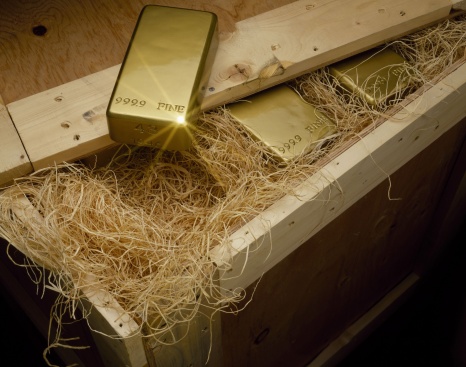While gold may no longer have the luster that it had in recent years, each major nation is a large owner of gold. Most currencies are now fiat currencies, meaning they are not all backed by hard assets, but most nations know that their currency does at least have to have some asset base behind it.
24/7 Wall St. has reviewed which nations are the largest holders of gold. These are counted by how much gold is owned by each central bank. It does not count how much is held by the exchange traded funds or in gold bars and coins owned by individuals, all the world’s jewelry and other forms of gold.
24/7 Wall St. compared this to the respective gross domestic product (GDP) of the most recent year (2014) on the traditional purchasing power parity calculation that is used by most economists. This is the GDP (or value) of all final goods and services produced within a nation in a given year, and then valued at prices prevailing in the United States in the year noted.
We also have included how each nation counts on its gold holdings, versus how its GDP ranks in the world’s top nations, and excluded the European Union from GDP ranking and also excluded the European Central Bank (ECB) and International Monetary Fund (IMF) from the central banks holding the most gold.
What gold bugs should know is that the IMF has not been counted as a nation here. Also, the members of the ECB are counted individually, even though the ECB is a large holder as well. The IMF holds some 2,814 tonnes of gold, which would rank third in the world if it was a central bank. The ECB holds 504.8 tonnes, which ranks as the 12th largest holder, if it was a country.
ALSO READ: Despite Lower Gold Prices, Why Tech and Industry Keep Using Less and Less Gold
The combined holdings of all central banks was over 32,000 tonnes toward the end of 2014. Since 2010, central banks have been net buyers of gold, and their demand has expanded rapidly from less than 2% of total world demand in 2010 to as much as 14% by 2014. The top 10 nations, excluding the IMF, held over 22,300 tonnes of gold as of June 2015. If you add up the IMF and ECB’s holdings, those 12 combined held over 25,600 tonnes of gold as of June 2015.
Now consider that there were 183,600 tonnes of known gold in existence above ground at the end of 2014 in all forms.
1. United States
> Tonnes: 8,133.5
> Pct. reserves: 74%
> GDP (rank): $17.40 trillion (2)
The United States was not the top global economy in 2014 by GDP on a purchasing power parity basis. Still, the U.S. government is the largest official holder of gold in the world by far — even if rumors persist that the gold held in Fort Knox isn’t really there any longer. The U.S. holdings of gold, despite the massive dollar appreciation against other key currencies, are not likely to officially change very much ahead. The United States could arguably use more gold after the quantitative easing, but the Federal Reserve now has to figure out how to deal with some $4.5 trillion worth of bonds it holds. Having 74% of its foreign reserves is an impressive number, even if the current $500 billion annual deficit and the $18 trillion in debt are not something to be proud of.
2. Germany
> Tonnes: 3,381.0
> Pct. reserves: 68%
> GDP (rank): $3.62 trillion (5)
Germany has several issues to consider when it comes to gold holdings. First, Germany is the largest economy in Europe, and the euro itself is somewhat of a watered-down Deutsche mark. Germany recently committed to repatriating its foreign gold holdings held in other central banks around the world. Germany also has been a light seller of gold since 2000 under Europe’s Central Bank Gold Agreements, with its holdings down a few tonnes each year.
3. Italy
> Tonnes: 2,451.8
> Pct. reserves: 66%
> GDP (rank): $2.07 trillion (12)
It may seem odd to think of Italy as one of the world’s top gold holders, and its official gold tonnage would be just under that of the IMF. Being in the PIIGS (Portugal, Italy, Ireland, Greece, Spain) has not hurt its credit of late, even during the shakeup seen in Greece. Still, some leaders in Europe wanted Italy to sell some of its gold if things got too bad. Italy does not want to unload its gold, and its stock market is up about 75% from mid-2012.
Deutsche Bank Upgrades 2 Top Gold Stocks to Buy
4. France
> Tonnes: 2,435.4
> Pct. reserves: 65%
> GDP (rank): $2.58 trillion (8)
The French economy still keeps the country from buying gold, and France had been a seller of gold before 2010 under the Central Bank Gold Agreements. Still, being the fourth largest nation in gold reserves sounds good when you consider its economy is now ranked eighth in the world. France is likely to have socioeconomic issues for years, and despite socialism trends, it has chosen higher taxes rather than selling gold in the past few years in an effort to pay for its social benefits.
5. China
> Tonnes: 1,658.1
> Pct. reserves: 2%
> GDP (rank): $17.63 trillion (1)
China recently was featured among the five nations still buying gold for their central banks. The Peoples Bank of China was a known gold buyer for years, but only recently has it showed by how much. China increased its gold reserves by over 50% since its last formal announcement back in 2009. At only 2% of foreign reserves, the World Gold Council and others expect that China can and likely will continue to increase its gold holdings. Even with a slowdown and devaluation, China’s holdings of gold quite simply remain too low for where it wants its reserve currency status to be in the years ahead — and China’s status as a reserve currency was recently put off.
ALSO READ: 10 Things to Consider About the Recent Market Panic
6. Russia
> Tonnes: 1,275.0
> Pct. reserves: 13%
> GDP (rank): $3.57 trillion (6)
Russia also was featured recently among the five nations still buying gold for their central banks. Russia keeps adding gold to its central bank holdings, a trend that was in place long before Ukraine and subsequent embargoes and sanctions were causing a recession. The difference here is that Russia may be adding it from actual domestic gold production rather than buying it on the international markets. Russia’s economic woes also have added pressure on Russia to keep buying gold to keep an underlying value under the ruble. The nation also wants to move away from the dollar and euro being used locally in the economy. Russia faces serious problems due to the collapse of oil prices as well.
7. Switzerland
> Tonnes: 1,040.0
> Pct. reserves: 7%
> GDP (rank): $444.70 billion (40)
Switzerland may have a checkered history around selling gold, when prices were low during Central Bank Gold Agreements selling, and then in 2014 its voters rejected a call to expand its gold reserves from 7% to 20% of reserves. Still, Switzerland’s formal statistics around its gold are more than impressive, even when you consider it is the world’s banking center. The nation created a financial shock when it surprisingly unpegged the Swiss franc against the euro in early 2015. Now it seems that Switzerland will have to hold on to its remaining gold as a result of the devaluation and financial losses. Switzerland may be the seventh largest nation holding gold, but its global economic ranking is only 40th in the world by GDP, and its population of 8.1 million people is ranked only 96th in the world.
8. Japan
> Tonnes: 765.2
> Pct. reserves: 2%
> GDP (rank): $4.81 trillion (4)
Despite all the quantitative easing measures, Japan has had a static gold supply for years now. Japan’s gold is also just 2% of foreign reserves as well. That low reserve ratio could become a real problem in the decades ahead if (or when) its aging population trends run into problems dealing with its debt-to-GDP, which now is about 230%. Japan wants to grow its economy in any way it can, hence the never-ending quantitative easing.
ALSO READ: 7 Countries Near Bankruptcy
9. Netherlands
> Tonnes: 612.5
> Pct. reserves: 57%
> GDP (rank): $798.10 billion (27)
The Netherlands has been a long-time owner of gold as one of the wealthier nations in the world. It seems impressive to still be ranked ninth in the list of nations holding gold when its GDP ranking is 27th and when its small population of almost 17 million ranks only 66th in the world. Not bad for a nation that seems to be the poster-boy for riding bikes to work. The Netherlands was a seller of gold from 2002 to 2008 under Central Bank Gold Agreements. Since then it has held its gold tight.
10. India
> Tonnes: 557.7
> Pct. reserves: 6%
> GDP (rank): $7.28 trillion (3)
India has held up better in its recovery than China, but India has a mixed recent history with gold. It handily ramped up gold holdings in recent years, before gold prices went through the roof, but then it also had strong regulations and import taxes on gold, which recently have been removed. Consumers in India love gold, perhaps more than people in any other major nation. In 2009 India bought 200 tonnes of gold from the IMF to bolster its reserves. While India’s central bank probably needs more gold holdings for its 1 billion population, it sees that if India will not spend enough on infrastructure build-outs, then it will not bother buying more gold either.
*********
Data on tonnes held by each central bank, changes from the Central Bank Gold Agreements and the percentage of central bank reserves was taken from the World Gold Council. GDP data and rankings of population were from the CIA World Factbook.
ALSO READ: How Far Can Chinese Stocks Fall?
Take Charge of Your Retirement In Just A Few Minutes (Sponsor)
Retirement planning doesn’t have to feel overwhelming. The key is finding expert guidance—and SmartAsset’s simple quiz makes it easier than ever for you to connect with a vetted financial advisor.
Here’s how it works:
- Answer a Few Simple Questions. Tell us a bit about your goals and preferences—it only takes a few minutes!
- Get Matched with Vetted Advisors Our smart tool matches you with up to three pre-screened, vetted advisors who serve your area and are held to a fiduciary standard to act in your best interests. Click here to begin
- Choose Your Fit Review their profiles, schedule an introductory call (or meet in person), and select the advisor who feel is right for you.
Why wait? Start building the retirement you’ve always dreamed of. Click here to get started today!
Thank you for reading! Have some feedback for us?
Contact the 24/7 Wall St. editorial team.



